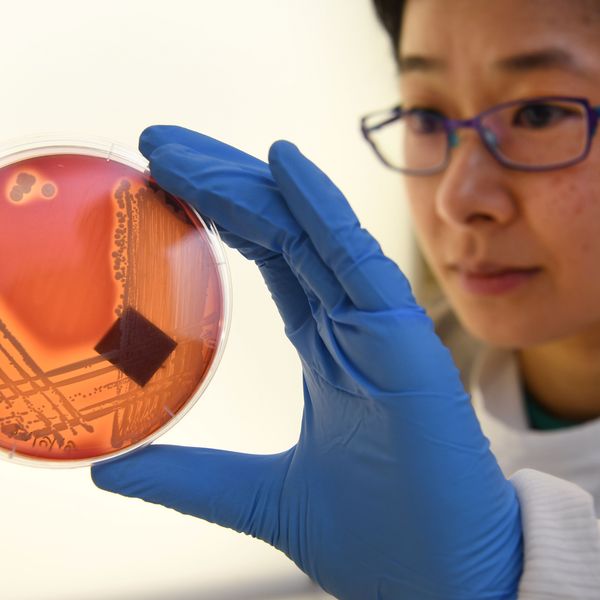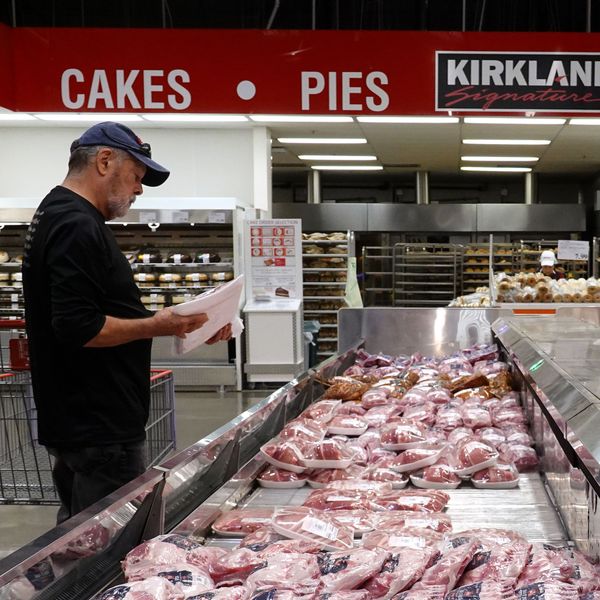'Huge Victory for Health': FDA Orders Antibacterials Removed from Soaps
Triclosan has been shown to disrupt hormones and muscle function, environmental groups say
The U.S. Food and Drug Administration (FDA) on Friday issued a rule banning antibacterials in soap, which the agency said were no more effective than simple soap and much more harmful for the environment and consumer health.
The FDA gave companies a year to remove chemicals such as triclosan and triclocarban from their products or take them off the shelves entirely, and an additional year to get rid of ingredients like benzalkonium chloride, which are less commonly used.
"Consumers may think antibacterial washes are more effective at preventing the spread of germs, but we have no scientific evidence that they are any better than plain soap and water," Janet Woodcock, M.D., director of the FDA's Center for Drug Evaluation and Research (CDER), said in a statement. "In fact, some data suggests that antibacterial ingredients may do more harm than good over the long-term."

As environmental and public health groups have noted, triclosan has been shown to disrupt hormones and muscle function. And although the chemical kills bacteria by breaking open their cell walls, the process takes up to nine hours--so it is ineffective when simply washing hands.
"This decision by the FDA is a huge victory on behalf of human health and the environment," said Environmental Working Group (EWG) president and co-founder Ken Cook.
The organization, which has offices in California, previously found "widespread" triclosan contamination in the San Francisco Bay.
Mae Wu, a senior attorney in the Health Program at the Natural Resources Defense Council (NRDC), said, "Consumers have waited a long time for this sensible safeguard. Banning triclosan in these products is a huge step toward ensuring that the soaps we use every day on our bodies are safer."
"But," she added, "FDA also needs to act quickly to ascertain the safety of at least two other chemicals (benzalkonium chloride and benzethonium chloride) in these products that are suspected of posing serious health risks. Consumers must never be treated as guinea pigs."
Many companies have already removed triclosan from their soaps, after the FDA issued a separate proposed rule in 2013 requiring manufacturers prove their antibacterial products are safe and effective.
An Urgent Message From Our Co-Founder
Dear Common Dreams reader, The U.S. is on a fast track to authoritarianism like nothing I've ever seen. Meanwhile, corporate news outlets are utterly capitulating to Trump, twisting their coverage to avoid drawing his ire while lining up to stuff cash in his pockets. That's why I believe that Common Dreams is doing the best and most consequential reporting that we've ever done. Our small but mighty team is a progressive reporting powerhouse, covering the news every day that the corporate media never will. Our mission has always been simple: To inform. To inspire. And to ignite change for the common good. Now here's the key piece that I want all our readers to understand: None of this would be possible without your financial support. That's not just some fundraising cliche. It's the absolute and literal truth. We don't accept corporate advertising and never will. We don't have a paywall because we don't think people should be blocked from critical news based on their ability to pay. Everything we do is funded by the donations of readers like you. Will you donate now to help power the nonprofit, independent reporting of Common Dreams? Thank you for being a vital member of our community. Together, we can keep independent journalism alive when it’s needed most. - Craig Brown, Co-founder |
The U.S. Food and Drug Administration (FDA) on Friday issued a rule banning antibacterials in soap, which the agency said were no more effective than simple soap and much more harmful for the environment and consumer health.
The FDA gave companies a year to remove chemicals such as triclosan and triclocarban from their products or take them off the shelves entirely, and an additional year to get rid of ingredients like benzalkonium chloride, which are less commonly used.
"Consumers may think antibacterial washes are more effective at preventing the spread of germs, but we have no scientific evidence that they are any better than plain soap and water," Janet Woodcock, M.D., director of the FDA's Center for Drug Evaluation and Research (CDER), said in a statement. "In fact, some data suggests that antibacterial ingredients may do more harm than good over the long-term."

As environmental and public health groups have noted, triclosan has been shown to disrupt hormones and muscle function. And although the chemical kills bacteria by breaking open their cell walls, the process takes up to nine hours--so it is ineffective when simply washing hands.
"This decision by the FDA is a huge victory on behalf of human health and the environment," said Environmental Working Group (EWG) president and co-founder Ken Cook.
The organization, which has offices in California, previously found "widespread" triclosan contamination in the San Francisco Bay.
Mae Wu, a senior attorney in the Health Program at the Natural Resources Defense Council (NRDC), said, "Consumers have waited a long time for this sensible safeguard. Banning triclosan in these products is a huge step toward ensuring that the soaps we use every day on our bodies are safer."
"But," she added, "FDA also needs to act quickly to ascertain the safety of at least two other chemicals (benzalkonium chloride and benzethonium chloride) in these products that are suspected of posing serious health risks. Consumers must never be treated as guinea pigs."
Many companies have already removed triclosan from their soaps, after the FDA issued a separate proposed rule in 2013 requiring manufacturers prove their antibacterial products are safe and effective.
The U.S. Food and Drug Administration (FDA) on Friday issued a rule banning antibacterials in soap, which the agency said were no more effective than simple soap and much more harmful for the environment and consumer health.
The FDA gave companies a year to remove chemicals such as triclosan and triclocarban from their products or take them off the shelves entirely, and an additional year to get rid of ingredients like benzalkonium chloride, which are less commonly used.
"Consumers may think antibacterial washes are more effective at preventing the spread of germs, but we have no scientific evidence that they are any better than plain soap and water," Janet Woodcock, M.D., director of the FDA's Center for Drug Evaluation and Research (CDER), said in a statement. "In fact, some data suggests that antibacterial ingredients may do more harm than good over the long-term."

As environmental and public health groups have noted, triclosan has been shown to disrupt hormones and muscle function. And although the chemical kills bacteria by breaking open their cell walls, the process takes up to nine hours--so it is ineffective when simply washing hands.
"This decision by the FDA is a huge victory on behalf of human health and the environment," said Environmental Working Group (EWG) president and co-founder Ken Cook.
The organization, which has offices in California, previously found "widespread" triclosan contamination in the San Francisco Bay.
Mae Wu, a senior attorney in the Health Program at the Natural Resources Defense Council (NRDC), said, "Consumers have waited a long time for this sensible safeguard. Banning triclosan in these products is a huge step toward ensuring that the soaps we use every day on our bodies are safer."
"But," she added, "FDA also needs to act quickly to ascertain the safety of at least two other chemicals (benzalkonium chloride and benzethonium chloride) in these products that are suspected of posing serious health risks. Consumers must never be treated as guinea pigs."
Many companies have already removed triclosan from their soaps, after the FDA issued a separate proposed rule in 2013 requiring manufacturers prove their antibacterial products are safe and effective.

